All posts by Gary Stockton

A third of new businesses will close by their second year, according to the U.S. Small Business Administration. Running a business that beats the odds starts with ingenuity, grit, and guts. So, what does it take to build a business that can withstand decades of economic upheaval in between the boons and successes to remain resilient? We thought this was an interesting question, so we did some research, examining businesses that have been on file with Experian for decades to see what traits they share. For G&G Electric Supply in New York City, four generations of perseverance and the ability to pivot are in their company’s DNA, beginning with founders Gabriel and George. The Zildjian Company has roots dating back to 1623 Turkey, and then as immigrants landing on Ellis Island in 1929 on the eve of the Great Depression. As we’ve all experienced through this historic period of national economic uncertainty, changes can occur in business that force us to adapt and adjust quickly. Market conditions shift, and even the best plans and roadmaps are forced to contend with entirely different circumstances. For small business owners, these conditions can be scary, and the volatile situation is a reminder that past profits and recent confidence are no guarantee for future success. There are companies today that are still standing, despite the shaky conditions that were brought upon by roller-coaster economics and dramatic world events. Inspired by reviewing the profiles for this article, we present some of the most interesting, resilient businesses and the attributes we think set them apart from others. Perseverance G&G Electric Supply Company, Inc. Founded: 1914, New York, NY Industry: Electrical equipment, wiring, installation In the early 20th Century, partners Gabriel and George thrived due to the swift modernization of homes and businesses. Everyone wanted electricity in their house, apartment, shop, or office. Weathering the storm of the Great Depression, they landed contracts for the now-iconic Empire State Building and Radio City Music Hall. The war years, personal losses, and shortages that followed offered their own challenges, but the company adjusted and added more clients by diversifying into software development. When one arm of the business was soft, they buffed up another to remain profitable, never giving up. Now in its fourth generation of family partners, G&G Electric Supply Company is still the major electrical distributor in Manhattan, with increased technical acumen and a robust offering of products and services. Specialization Dlubak Specialty Glass Corp. Founded: 1900, Blairsville, PA Industry: Weather-proof glass, security glass, decorative glass As manufacturers of glass, Dlubak Specialty Glass products cover a wide variety of needs, including aesthetics, privacy, safety, and more. At the core, they make one thing: glass. But their customers vary from commercial properties and government offices to prisons and military protection. Their expertise is built on specific knowledge to ensure that they provide the correct glass for their clients’ important needs. At a company whose projects have included the safety glass atop the Observation Deck of 30 Rockefeller Center in New York, to gunner protection for the U.S. Army, to bullet-proof glass for foreign embassies worldwide, one of Dlubak’s secrets to success is that they are renowned experts in their knowledge and true specialists at their craft. Reputation The Zildjian Company Established: 1623, Samatya, Turkey. In the USA: 1929, Quincy, MA Industry: Music cymbals, drumsticks, percussion mallets The story of Zildjian begins with its founder practicing alchemy in Constantinople, attempting to turn other metals into gold. Though that effort didn’t work, he discovered a metal compound that he crafted into a perfect cymbal. After centuries of success in their native Turkey, the family moved the business permanently to the USA in the 20th century, and their customers followed the music, so to speak. Music industry professionals from house bands and studio musicians, to world-famous celebrities, continue to seek out the Zildjian brand as the standard in the industry, at least partly because, after almost 400 years, they have earned something no one can put a price on — customer trust. Consistency The Russian Tea Room Established: 1927, New York, NY Industry: Fine dining, in-house catering, private events There’s an expression, “Good taste never goes out of style.” With its upscale interior design, A-list clientele, and adherence to customs like High Tea, The Russian Tea Room restaurant has remained popular due to its standards of excellence and its elegant old-world décor. Founded by members of the Russian Imperial Ballet, it has always been associated with the beauty and grace of high art. Rather than bending to trends and fads, it is steeped in the century-old European tradition. For a business dinner, elegant couples’ night out, or wedding reception, this reservations-only dining establishment has maintained its place in Manhattan society through impeccable quality and classic décor. By continuing to offer an unparalleled experience through its food menu and stocked bar, it remains an institution of luxury and glamour. Adaptability Booz Allen Hamilton Established: 1914, McLean, VA Industry: Commercial business consulting, cybersecurity and technology, defense and intelligence consulting Edwin G. Booz Surveys, as the company was originally known, started as a business that observed other businesses and then offered advice on how to make improvements. Mr. Booz used his background in psychology to focus on the people in business, rather than the products. He effectively invented modern management consulting as an operational business. Focusing on the people is still a major guiding principle of the company a century later. On the USA’s entry into World War II, they helped prepare the US Navy and expanded from commercial consulting into government consulting. Their chameleon-like ability to shift and change enabled Booz Allen Hamilton to continue to grow and increase their specialties including technology, cybersecurity, and more. One might argue that Mr. Booz’s own original psychology studies might have encouraged his company’s ability to always evolve to the needs of the market in order to discover new areas of opportunity. Resilience: in conclusion These brief profiles give a sense of some of the traits exhibited by these successful businesses over time, the ability to adapt and pivot, or provide exceptional customer experiences consistently, or respond to customer demand by offering highly specialized products and services. Above all, be strong enough to endure times of economic uncertainty to emerge strong and resilient. We hope you find them as inspiring as we did.

Starting a small business can be very hard. Building strong credit for the business takes discipline and a certain amount of intention. In this post, we are going to start by describing two imaginary business owners working hard down on Main Street. Harry runs “Harry’s Hardware & Mercantile”, a busy hardware store. He has been trading with local do-it-yourselfers and contractors since 1973. Over the course of the business lifecycle, he established trade credit (Tradelines) with dozens of companies. Mildred just opened “Millie’s Fabric” next door to Harry’s on a shoestring after she got laid off from her job. She founded Millie’s by borrowing money from friends and family, charging most of her startup costs to her personal credit card. And that is where the paths of these two somewhat different businesses diverge. Harry discovered the benefits of establishing tradelines with his suppliers in the early stages of his business and now runs a resilient profitable business. Mildred is embarking on the difficult challenge of establishing her business and will need to manage her cash flow wisely. Like Harry, she will discover how beneficial tradelines will be to her success as she starts to form relationships with trading partners. What are tradelines and how can they benefit my business credit report? Tradelines or trade information comprises the financial payment obligations that a business has to its creditors, suppliers, and service providers that involve payment terms like Net 15, Net 30, 60 or 90. It means your business has that much time to pay back the balance of what you borrow. So, for example, if your business buys $300 worth of products at Net 30 terms, you have 30 days to pay it back. A business will start to add tradelines over the course of its lifecycle and establishing tradelines early in the life of the business can be very beneficial. Experian gets a lot of questions about how tradelines impact a business credit score, so in this post, we explain how that all works. Things to consider before applying for tradelines Establish a legal entity. In order for any business to establish trade terms with your company, take the steps to establish the business as a legal entity (ie; forming an LLC, or S Corporation), sole proprietors should make sure the business is registered with your Secretary of State. Establish separate bank accounts. Separate bank accounts will help keep finances separate and help your business track accounts payables. Business email and contact information. Your vendor will look for signs of credibility when assessing whether or not your business is legitimate. Having a business email address in the name of the company helps in that effort. Avoid using free email services like Yahoo or Gmail. Establishing a presence for your business on social media such as Facebook, Twitter, Instagram, LinkedIn or YouTube, depending where your customers spend time online. Bootstrapping a business in start-up is becoming more common, but the mistake that many business owners will make is leveraging their personal credit for company expenses. Doing this can hurt the owner’s personal credit, and it will not help to build strong credit for the business. It is much more beneficial to establish the business and start applying for credit in the name of the company. Trade supplier types When your business orders raw materials for your business, or purchases office supplies, you would sign for the goods and receive an invoice, and be provided a period of weeks to pay the balance. If your vendor is reporting to Experian, your payment history good or bad will be reported and be a contributing factor in your business credit score. Experian classifies these tradelines as trade supplier types and groups them into the following categories. Financial loan, line, lease, credit card Supply raw materials, building supply, office Services accounting, marketing, financial services Utilities telecommunications, gas, water, electricity Transportation ground, air transport If you are familiar with consumer credit reports, you should be familiar with financial trades, as they are on our consumer credit reports too. These tradelines include loans, lines of credit, leases, and credit cards. Commercial credit reports also include trades from other supplier types as well. Basically, any business that has a commercial accounts receivable portfolio can provide their information to Experian and can establish a tradeline for their business accounts. To contribute data to Experian, you must be able to export into TXT, CSV or XLS (Excel - saved as comma delimited) and also adhere to encryption guidelines. Data contributors are also required to submit monthly updates. If you are interested in becoming a business data contributor you can find more information about reporting to Experian here. How tradelines are classified and updated The first time Experian gets a trade from a specific data supplier for business, that is considered a new trade. On the next update of that trade, it is reclassified as a regular trade. If there are no updates to a regular trade within 3 months, it becomes an aged trade. A trade falls off the business credit report without an update in 36 months. It doesn’t end there; however, if an update comes in for an existing trade, even for a trade that fell off the business credit report, it becomes a regular trade again. Tradeline credit attributes Experian provides information on the total balance outstanding, total credit and utilization, payment delinquencies as of today, and payment trends over time. With this type of grouping, it’s easy to quickly identify newly added trades, regularly updated trades, and trades that are becoming stale. The tradeline disparity between male-owned and woman-owned small businesses Experian studied 3.1 million small business credit profiles between 2016 and 2018 and found variances in the number of tradelines in male-owned businesses compared to woman-owned businesses as the chart below describes. When we look at trade count and the amount of commercial debt or outstanding balances, we saw a different picture between the two cohorts. On average woman business owners have less than 1 tradeline ( avg. .6 trades) vs male business owners, who average roughly 1.4 commercial tradelines. When you compare the average balances, male business owners carry about $40,000 in commercial credit while women business owners carry about $25,000, a $15,000 difference. This difference in the number of tradelines puts women-owned businesses at a competitive disadvantage. To be competitive small businesses should strongly consider establishing tradelines and making on-time payments to these lines. How can tradelines help small businesses gain access to capital? Tradelines can help your business develop the credibility that matters to banks and other capital lenders. A business credit report that includes multiple, positive lines of trade credit in your company’s name shows that your business pays its creditors in a timely manner. Commercial Lenders review this business credit history of tradelines to determine whether to fund a loan or capital, as well as the interest rates and repayment terms if capital is extended. Businesses with good trade credit often qualify for loans with lower interest rates and better payment terms than those with poor or limited trade credit history. For more information about establishing business tradelines check out our post Building Strong Tradelines For Your Small Business.

Help is coming As America continues efforts to recover from the financial consequences related to the Covid-19 pandemic, some help is on the way for qualifying restaurants. Thanks to the Restaurant Revitalization Program, the U.S. Small Business Administration will be awarding funding to restaurants, bars, and similar food-and-drink-service businesses that meet eligibility requirements. This is a new initiative funded by the American Rescue Plan Act, which became law on March 11, 2021. Funds for business expenses The program will provide funds to cover revenue losses caused by the pandemic. The amounts awarded vary from $1,000 to $5,000,000 per location, to a maximum of $10,000,000 total per business. The funding is meant to provide “support the ongoing operations” of the business, according to the mandate from Congress. Funds may be used to cover many common business expenses, such as payroll (including wages and benefits costs), mortgage or rent, utility bills, construction, maintenance, supplier costs, and other operating expenses. Apply now Starting on Tuesday, May 3rd, eligible business owners can begin submitting applications. Applications will remain open only until allocated monies are expended to qualifying recipients. There is also a time limit on the use of funds granted to those businesses receiving money: March 11, 2023. So, interested businesses should begin their application process right away. Application requirements and information about necessary documentation can be found here: restaurants.sba.gov. More information on eligibility requirements and application documents are posted on the SBA website.
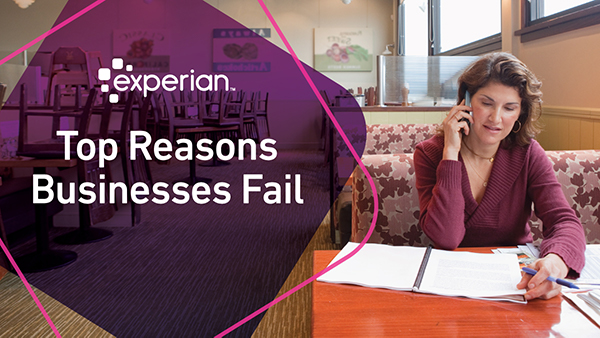
Some people might consider starting a business easy; the hard part is keeping the company open and profitable beyond the first two years. The odds of success are tough; a third of new businesses will close by the end of their second year. And 70% of these companies fade by year 10. According to the U.S. Census, 2020 business starts soared 27 percent to 4.4 million. COVID-19 closures and related layoffs were a likely catalyst. How many of these new businesses will succeed beyond their second year? It takes hard work, guts, and determination to grow a successful business, especially one that remains open for decades.The Small Business Administration studied business failure. In this post, we summarize ten leading reasons. Use them to keep your business on track. #10: Over-investment in fixed assets Up-front expenses are common for any business. However, over-investing early on can spell disaster. Evaluate the necessity of owning these assets. Perhaps you can lease or buy used equipment rather than buy new when you are just getting started. Avoid this problem by limiting start-up expenses, and maximize cash flow. #9: Personal use of business funds Some business owners will use their business to cover personal expenses, a big risk, and a potential accounting hazard. Many small business owners will use personal credit to bootstrap their operations. To bypass this mistake, keep your funding sources separate. To avoid legal liability, set up your business as an LLC, corporation, or partnership. #8: Poor inventory management For a young business, good inventory management is crucial. Tying up working capital in inventory can be risky. So, putting in place good inventory controls early on is just smart. Make conservative, experience-based projections of supply needs. Rather than draining capital and eroding profits, a business can set up a line of credit but must exercise proper control and accountability. #7: Unexpected growth As a business starts to flourish, it's tempting to invest everything back into it in order to grow. For the long-term, it's better to limit spending, especially on more significant expenses. Spending too much, too quickly exposes the business to increased risk, which can endanger working capital. #6: Unable to keep pace with competitors The free-market economy encourages competition. Competition can be good for consumers, but a new business must work hard to distinguish itself against larger, established competitors. Study them and look for areas of opportunity – the path to longevity is taking care of your customers. Find ways to deliver good value and good service. This will build good word of mouth and help set you apart. Business reviews are a great place to start building. #5: Location and visibility Visibility is a key component of success, so try to find a physical location close to where targeted customers work or live. Consider accessibility, parking, and the condition of the building. A business’s online presence is just as important – for both digital and brick and mortar businesses. Customers can’t buy from someone they can’t find, so a professional-looking website with pages designed to get found by search engines is a must. A strong presence on social media is equally important. #4: Lack of experience Good business leadership means having the experience to make the right decisions and anticipate the challenges in the initial stages of growth and beyond. Aside from the expected steps to build a business, leaders must adapt to handle the pressure and avoid costly mistakes. Before opening your business, know your products and services and research customer needs and the general market. #3: Poor credit arrangements A business must make customer payment and credit terms accessible, but it can hurt cash flow if your financing options are too flexible. Mobile payments such as Square, PayPal, Venmo, and Zelle may help provide easy payment solutions. Establishing clear credit terms for large accounts is best. Just as you assess the creditworthiness of your customers, your business is also being assessed by potential vendors. To be seen as good credit risk, keep tabs on your own business credit score. #2: Low sales Maintaining consistent sales levels is a significant success factor for any growing business. Low sales can result from keeping an underperforming sales force, having inferior products and services – or overpricing them, lacking a solid understanding of buying trends, or misreading the competition. Business owners need to be ready to make course corrections to increase sales and revenue. #1: Insufficient capital Having money on hand is an obvious necessity to run a business. Investors, government grants, and business loans are common ways to raise capital. Online lenders have stepped in to fill the gap left by major banks following the Great Recession. Getting a loan may not be difficult, but a new business lacking credit history may face less favorable terms. Even if showing a profit, small businesses must focus on maintaining positive cash flow and paying bills on time to build strong credit. Don’t allow poor credit to limit your potential When it comes to managing your business credit, think of Experian. Whether you need to monitor your own business credit report or evaluate others, Experian® SmartBusinessReportsSM has the ideal small-business reporting service for you. Experian’s business credit reports and subscriptions are the best value for the money, giving you the choice to monitor your business credit reputation or instantly evaluate business backgrounds and credit scores on your suppliers and customers.

For many of us, 2020 has been the hardest year of our lives. As a society we are all going through this together, we know the pandemic will eventually end, and we all look forward to better days. Since the pandemic started the small business community has suffered greatly. We hear many stories about business owners struggling to survive. About business owners having to lay off staff and close permanently. But we draw inspiration from many of the innovation stories making headlines, stories about businesses who made a pivot to join the fight, and support healthcare professionals on the frontlines of the virus by converting factories to make PPE. We hear how small businesses navigated applying for the first round of PPP loans, and hope meaningful relief for small business comes soon. We draw inspiration from small business progress, and we stand strong with the people who went after their dreams. The pandemic will end, but dreams will not. It’s been said so many times that small businesses are the engine of our economy, and they truly are. Our commitment to helping small businesses with their financial health will continue to be unwavering. Supporting small businesses, helping them to create a better tomorrow Find out more about how Experian is supporting small businesses. https://www.experian.com/small-business/mybusinessfuture #smallbusiness #mybusinessfuture #businesscredit
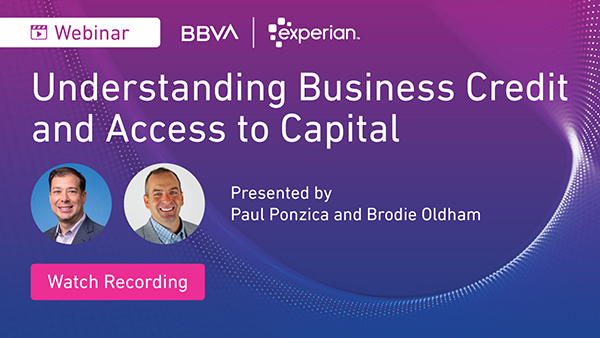
Experian and BBVA will be discussing how small businesses can build strong credit to gain access to capital in an upcoming webinar.
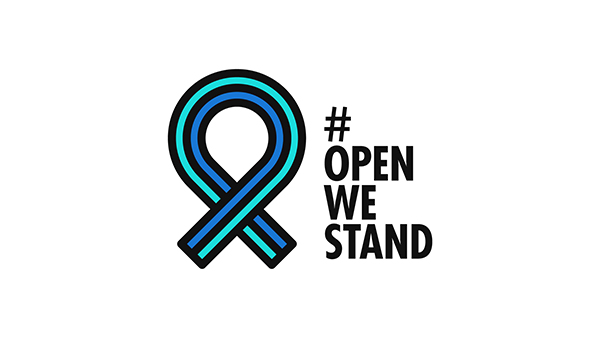
Corporate Pledge Experian pledges to continue to help small businesses manage their risk, grow their business, and navigate their financial health during and after these turbulent times. We are offering small business owners 20% off their initial business credit report and 50 percent off a one-year subscription to monitor their business credit score. Going through this unprecedented time takes strength, and we pledge to support small businesses. https://www.smartbusinessreports.com/godaddy/ Experian is proud to have served and continue serving the small business community for over 70 years. We have learned a lot, as we have stood with small business through the best and worst of times. Most importantly, we understand that as the economy faces challenges, so do the ambitions and dreams of small business owners – and we have tailored our solutions with this in mind. Our credit data is an integral ingredient in the success of any business. An accurate view of financial health help businesses better evaluate trading partners, tap into new markets and make real-time decisions. It’s important that every small business owner knows where they stand and how others see them, especially during the times when they may need access to new capital. To ensure that small businesses have additional resources at their disposal to make informed decisions at this critical time, we are providing discounts on our 1-year monitoring service subscriptions. We also feel a deep obligation to our clients, the lenders, trade creditors, utilities, insurance underwriters, and more as they strive to support small businesses during this time. To further help small businesses gain access to capital they need, Experian also launched its free COVID-19 U.S. Business Risk Index to assist lenders and government organizations in understanding how to make lending options available to the business segments that need it the most. This new risk index can help business risk professionals better understand the impact that the pandemic may have on commercial operations based on several key factors. We hope that our data and advanced analytics enable our clients to offer fair and responsible lending to small businesses that need it most during this time. We encourage small business owners and partners to hold fast to your original visions and leverage our experience. No dream is too big, whether you are a company of one or one hundred, we’re here to support you. And together, we can create a better tomorrow. Hiq Lee, PresidentExperian Business Information Services #OPENWESTAND
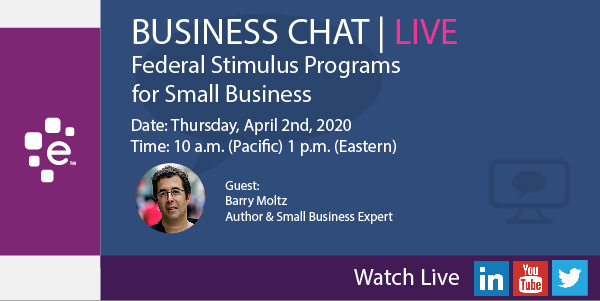
Federal Small Business Stimulus Programs In response to the economic impact of the Coronavirus, President Donald Trump signed legislation that will allocate $2.2 trillion in federal small business stimulus funding to support the U.S. economy, small businesses are among those that will benefit.The Small Business Administration, under the stimulus package, will oversee the Paycheck Protection Program, and the Economic Injury Disaster Loans and Loan Advance program which combined will distribute $350 billion to small businesses that can be partially forgiven if the companies meet certain requirements.To help clarify the programs, we have invited small business author and expert Barry Moltz to share what small businesses need to know about these programs.
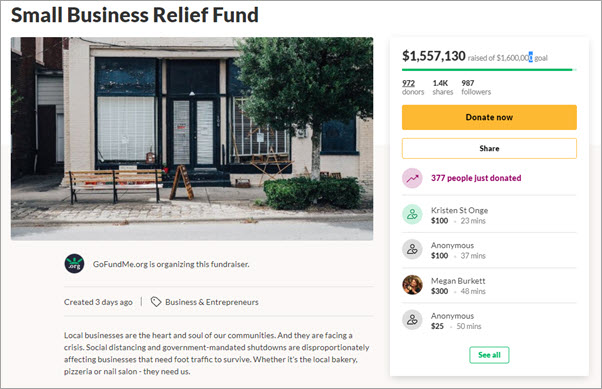
As the infections of Coronavirus continue to escalate unabated, millions of small businesses are closing and laying off workers. Others send the majority of their staff to work from home, as in our case here at Experian. If you are a business who can pivot to virtual selling Covid-19 may just be a temporary setback, but for other non-essential retail businesses laying off staff and closing their doors, workers have few options. I got a little burned out from watching all of the bad news as I flipped around cable the other night so I retreated to the den to read articles and saw that three days ago GoFundMe had set up a Small Business Relief Fund for businesses impacted but Covid-19. The goal of the fund is to raise $1.6 million, and as of this writing had raised $1.557,130 with major donations coming from Intuit Quickbooks, Yelp and GoFundMe. Hats off! Small Business Relief Fund The site is filled with over 80,000 businesses looking for donations. As I sat reading the stories about businesses here in Orange County, California, I was struck by the outpouring of support and the heartwarming comments left by customers. Many of the campaigns are launched by business owners who want to do right by their people while their businesses are struggling to remain open. Orange County businesses fight to survive A nurse from Children's Hospital Orange County picks up from Blue Bowl Teague, Ish, and Craig from Veteran-owned Blue Bowl Superfoods in Orange, California have a target of $50,000 from which a portion will go to feeding healthcare workers from nearby CHOC and St. Joseph hospitals. Their campaign description is a defiant open letter addressed to COVID-19 which reads "We are a veteran-owned small business fighting to keep our lights on because of you. You will not destroy our jobs and you will not destroy what we do." As of this posting his campaign had raised $11,548. Blue Bowl Superfoods GoFundMe Campaign I reached out to Blue Bowl and spoke with the company co-founder Teague Savitch. Teague got the idea for the company while deployed to Afghanistan in 2014, telling me “Towards the tail end of my deployment experience I was working in a team that was doing 24-7 operations and on-call all the time, always eating on the go. It was the first time in my life where for an extended period I was getting very little sleep and a lot of stress. When I came home, I started going to juice bars and really paid more attention to what I put in my body. That's when I kind of really got interested in the superfood movement. And from that Blue Bowl Superfoods was born.” When asked why he started a GoFundMe he responded “We're fighting to try and keep our doors open, and keep a paycheck going for our team, and it just so happens that our first location that we opened just over four years ago is right in the backyard of two major Orange County hospitals - Children's Hospital, Orange County and Saint Joseph Hospital. Both of those hospitals have been very key to our early success, spreading the word about our company and what we do. It's been a really popular item with hospital staff that need a meal that's healthy performance-enhancing nutrient-dense where they can come in quickly grab and go, get in and out of there and get back to doing their rounds in the hospital.” Solopreneurs turn to GoFundMe Cali Creechers GoFundMe Campaign Emily Creech of Cali Creechers, a pet sitting and dog walking business, is using GoFundMe to raise $3,500 to offset cancellations saying "most of my clients have had to cancel trips, work from home and isolate themselves from other humans in order to stay healthy." The impact of Covid-19 not only threatens her livelihood, but also her housing situation. I reached out to Emily to ask how she heard about the GoFundMe idea and she said: “I actually got an email from QuickBooks because I have QuickBooks for my business which is to keep everything organized, and they said they were sponsoring or helping promote the idea that you can start to go fund me for a local small business.” Emily says things started to change in her business around the 13th of March when she had one really big booking get canceled saying “I think people are canceling their trips because they have to, they're scared or they're elderly and they don't want anyone coming in their home to pick up their dog.” Cali Creechers got started after Emily started walking people’s dogs in her free time, picking up gigs using the Rover app. She said “You pass a background check and create a profile and people who need dog care can kind of narrow down their searches and get someone to care for their dog. So, I did that and I had a lot of really good response and I realized that it’s something I'm good at.” But Rover understandably charged a 20% fee on all of her business, so one day she decided to set-up an LLC so she could earn 100% of what she makes. Non-essential service-based businesses suffer sudden closures Team 12 GoFundMe Campaign Josh Boyd founded Costa Mesa-based Team 12 Group Training in 2013. He tells us that when the State ordered all non-essential businesses closed he had to lay off his 37 employees. He's hoping GoFundMe can help him raise $60,000 to help his employees, all out of work. Josh explained in his campaign profile, the revenue for his business is 100% Subscription-based and now that training sessions are on hold, they have no revenue to pay employees. I asked Josh if he thought Covid-19 would do any lasting damage to his business he said, "Once this is over the public will flock to gyms and have a deeper appreciation for the service based industry because they realize how hard it is to get motivated on their own.” Adding “You truly don’t value things as much until you actually lose it!”

